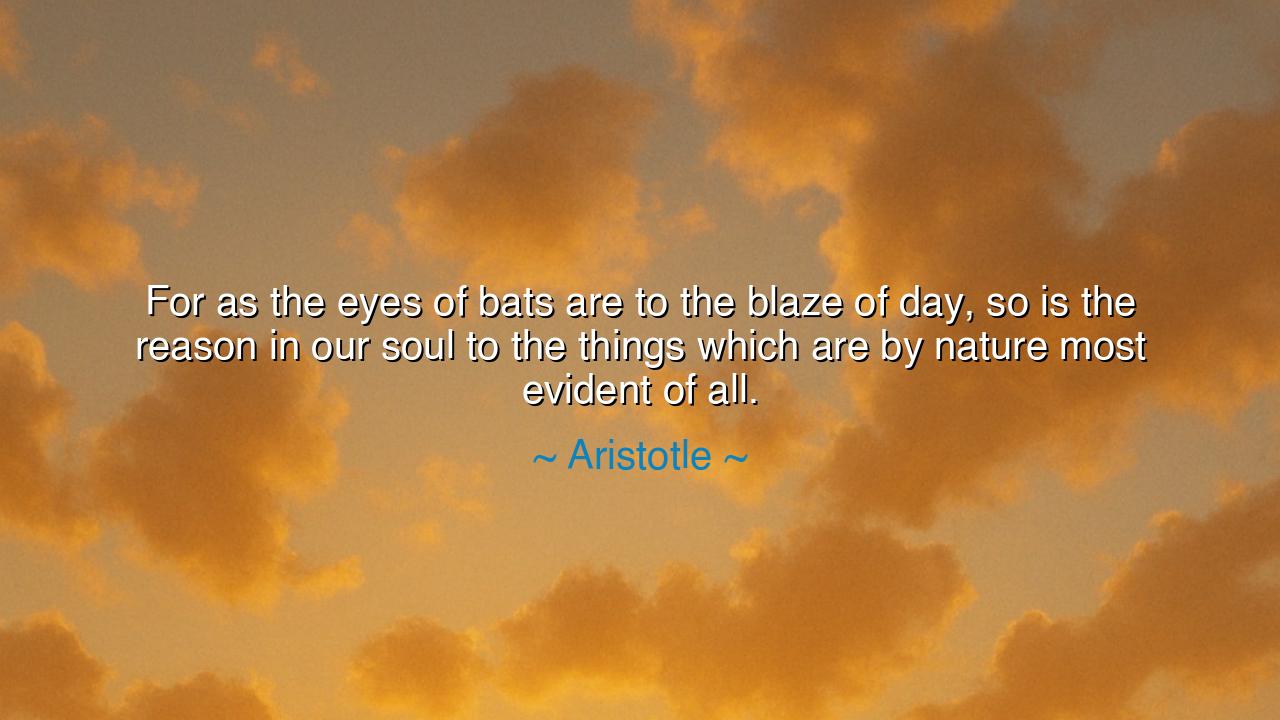
For as the eyes of bats are to the blaze of day, so is the
For as the eyes of bats are to the blaze of day, so is the reason in our soul to the things which are by nature most evident of all.






Hear the voice of Aristotle, master of reason, who declared: “For as the eyes of bats are to the blaze of day, so is the reason in our soul to the things which are by nature most evident of all.” These words, wrapped in the language of metaphor, carry a truth both humbling and eternal: that even the finest instrument of human thought, the reason of the soul, is weak and dazzled when confronted with the highest realities. Just as the bat, made for twilight, cannot gaze upon the sun, so too our mortal minds falter when brought near to truths that burn with divine clarity.
What Aristotle reveals is the paradox of knowledge: that we believe ourselves wise when examining what is near and small, yet stumble when we attempt to behold what is greatest and most fundamental. Our reason is sharp enough to measure shadows, to trace lines, to debate the fleeting, but when it confronts the evident truths of nature—existence, eternity, goodness, being itself—it is as if we are blinded by too much light. The brilliance overwhelms us, not because truth is hidden, but because it is too vast, too radiant for our dim faculties.
The ancients often spoke of this struggle. Consider Plato’s Allegory of the Cave, in which men bound in shadows mistake dim images for reality. When one prisoner is freed and led toward the sunlight, he is blinded, unable at first to comprehend the source of all illumination. So it is with Aristotle’s bats: our minds are like creatures of the night, skilled in half-light, but struggling to endure the blaze of day when confronted with ultimate reality. The truth is not absent—it is too present, too overwhelming.
History gives us examples of this blindness. The great astronomer Galileo Galilei uncovered truths about the heavens that were, by their very nature, evident: that the Earth moves, that Jupiter bears moons, that the stars are without number. Yet men of his time, though gifted with reason, recoiled from these blazing truths as bats from sunlight. Their minds could not endure the splendor of what had been revealed, and they turned instead to the safety of shadows. Thus Aristotle’s words are not only philosophical, but prophetic of the way humanity often responds to truth.
But this blindness is not a curse—it is a call to humility. We are reminded that our reason, though divine in its origin, is still limited by the vessel of flesh. We cannot seize the highest truths with arrogance, but only with reverence, patience, and discipline. The soul must be trained, just as the eyes must grow accustomed to light. Slowly, step by step, through philosophy, through reflection, through virtue, the mind strengthens itself to endure more of the radiance that once blinded it.
The lesson is clear: do not mistake your discomfort before a truth as proof that the truth is false. Do not shrink from the brightness of what challenges you. Rather, like the freed prisoner in Plato’s cave, endure the pain of the light until your vision adjusts. The reason in your soul is not powerless—it is simply unaccustomed. With humility and perseverance, you may come to see more clearly the things which at first seemed overwhelming.
Practical action flows from this wisdom. Read deeply, even when the words confuse you. Reflect often, even when the silence feels heavy. Question courageously, even when the answers unsettle your peace. Train your mind not only in the easy shadows of half-truths, but in the difficult light of realities that shine too bright. For though you may stumble like the bat at dawn, each effort strengthens your vision, preparing you to glimpse truths that endure beyond time.
So let Aristotle’s words be remembered: “As the eyes of bats are to the blaze of day, so is the reason in our soul to the most evident truths of nature.” Carry them as both a warning and a promise. A warning, that human reason is fragile before ultimate reality. A promise, that with patience and humility, the eyes of the soul may yet learn to endure the light. For the greatest truths are not hidden from us—they are waiting, radiant as the sun, until we are ready to behold them.






AAdministratorAdministrator
Welcome, honored guests. Please leave a comment, we will respond soon